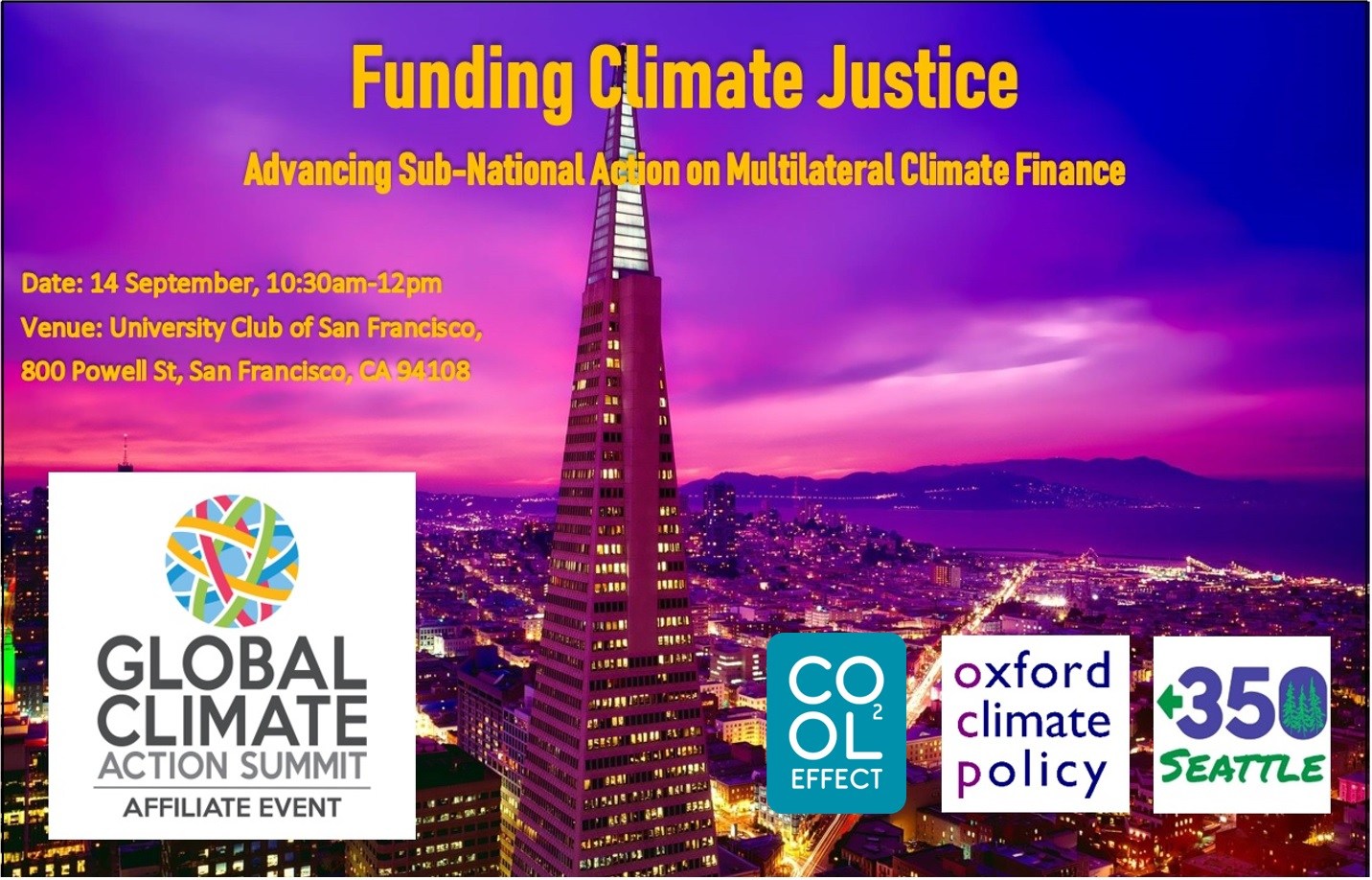
This Global Climate Action Summit Affiliate Event on 14 September 2018, at the University Club of San Francisco, was co-hosted by Oxford Climate Policy, Cool Effect, and 350 Seattle. Leaders, stakeholders, activists, and experts discussed how to advance sub-national action on multilateral climate finance to ensure financial support to developing countries – especially those most vulnerable – despite the Trump Administration cancelling America’s promised funding to the Green Climate Fund.
Across the US there is a growing realization that climate change is a serious issue that needs to be tackled. A growing coalition of US sub-nationals – states, cities, corporations, counties, universities, grassroot networks, non-profit organizations, and individuals – have come to see the withdrawal from the Paris Agreement by the Trump administration as a reckless act of geo-political vandalism. Thousands have signed pledges to stick to the deal struck in 2015.
But the Paris Agreement is not just about emission reductions. It is equally about providing financial support to developing countries – especially the most vulnerable ones – to help them fight climate change and its adverse impacts. One of the key instruments of the Paris Agreement for this purpose is a number of multilateral funds collectively known as the Agreement’s “financial mechanism.”
These funds serve as a beacon to developing countries that their plight is recognized and appreciated. This helps to reduce a prevailing sense of injustice, which could scuttle all efforts to coordinate the worldwide carbon cuts necessary to address climate change successfully. Tragically, the Trump administration has decided to discontinue contributions to these funds and also to renege on contractual obligations incurred by the Obama administration, in particular, to contribute an additional $2 billion to the Green Climate Fund.
The event discussed the need for sub-national action on multilateral climate finance and showcased three ideas of how sub-nationals could contribute to the financial mechanism of the Paris Agreement:
- A Massachusetts-UN Least Developed Countries Fund (MLDCF) would be established under Massachusetts state law by means of a bill written by State Senator Mike Barrett. The bill proposes to add a new “check-off” option to the six options involving other good causes that are already included on Massachusetts state income tax forms for the convenience of taxpayers who wish to make donations over and above their income tax obligations. Contributions to the MLDCF would be relayed to the Least Developed Countries Fund established by the United Nations Framework Convention on Climate Change. The MLDCF would be legally constituted as well to receive other gifts, grants, and donations to the UN Fund.
- The Western Climate Fund is a regional, multi-state instrument proposed by Oxford Climate Policy in collaboration with the Chair of the UNFCCC Least Developed Countries Group to collect resources from a variety of sources — focusing on shares of proceeds of carbon policy instruments (e.g. the sale of emission trading permits, or carbon tax revenue) — centered around, but not limited to, the Canadian Provinces and US States of the Western Climate Initiative, with the aim of collecting funding for the multilateral funds serving the Paris Agreement.
- The U.S. nonprofit organization Cool Effect has launched several successful campaigns to give individuals a way to contribute to the global fight against climate change. #STILLIN is one of the crowdsourcing initiatives in progress. It will allow individuals to pledge US$ 1 or more toward funding the gap caused by the current administration’s exit from the Paris Agreement. Contributions will be directed toward groups such as the Adaptation Fund with an emphasis of supporting projects that directly help people most effected by climate change.
Following the presentations, a panel of distinguished stakeholders, including the Chair of Least Developed Countries Group in the UN Framework Convention on Climate Change (UNFCCC), discussed the importance of multilateral finance in advancing both mitigation and adaptation ambition.
Speakers and Panelists (in alphabetical order)
- Dr Achala Abeysinghe, Principal researcher and team leader, global climate change governance at IIED, Senior Legal & Strategy Adviser to the Least Developed Countries (LDC) Chair; panel facilitator.
- Senator Michael J. Barrett, author of proposed legislation enabling MA state income tax payers to donate to the UNFCCC LDC Fund when filing their annual tax returns; presenting the MLDCF
- Heather Coleman, climate policy manager at Oxfam America; panelist.
- Gebru Jember Endalew, Chair of the LDC Group at the UNFCCC; panelist.
- Alex Lenferna, Fulbright Scholar, Department of Philosophy, University of Washington, 350 Seattle, Co-host and facilitator
- Jodi Manning, Director of Marketing for Cool Effect presenting #STILLIN and other crowdsourcing initiatives for individuals.
- Tosi Mpanu-Mpanu, GCF Board Member, Lead UNFCCC negotiator DRC, former LDC Group Chair, former African Group Chair; panelist.
- Professor Benito Müller, Convener International Climate Policy Research, Environmental Change Institute, University of Oxford and Managing Director, Oxford Climate Policy (OCP); OCP co-host and presenting the WCF.
